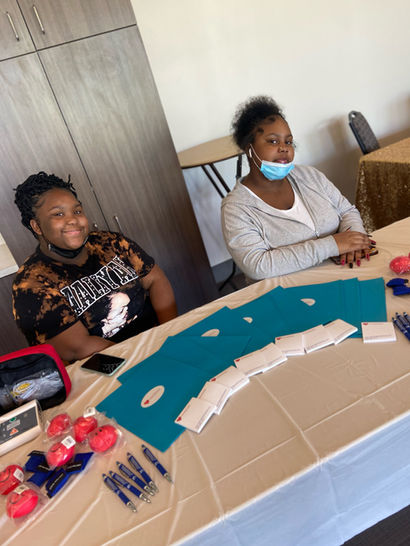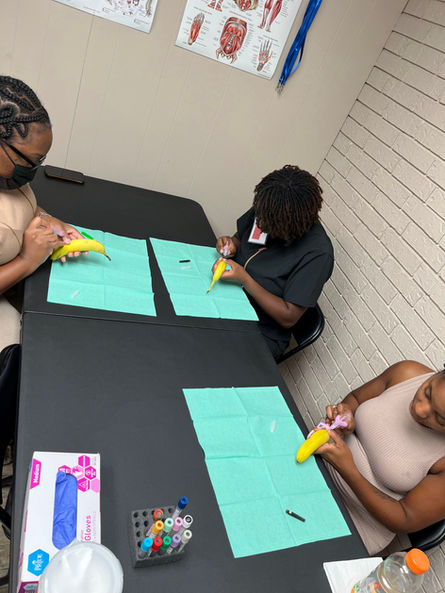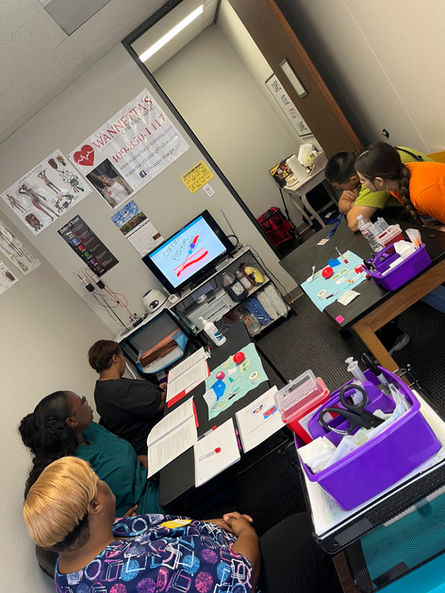HOUSTON'S TRUSTED CPR & FIRST-AID CERTIFICATION TRAINER
Wannetta CPR Training LLC will teach you the skills necessary to feel confident to give CPR/First Aide and use an AED in case of a real emergency on anyone at any time. We have been in business since 2010 and counting. We have the Certification you need rather you are a Health Care Provider, Caregiver at a Day Care, Lifeguard, Foster Parent, School Bus driver etc….
All of our CPR, First Aide, AED and ACLS Classes are governed by the American Heart Association Guidelines.
We combine the American Heart Association (AHA) video-based teaching, verbal instruction, printed material, and hands-on skills practice using our manikins. You will learn in a fun, low-stress environment designed to enhance your learning experience with real-life experiences. AHA certification cards are provided upon completion of course certifying each student for a period of two (2) years.
CPR, First-aid knowledge are essential, especially if you want to prepare yourselves for things that could happen to you or a loved one. Remaining calm and knowing how to act during emergency situations can make a difference in a person's life. You could save them from short-term, long-term disability, or death.
Introducing a Branch of Wannetta's CPR Training LLC, Reach Out N' Touch Health Care Training. Now Offering an Accelerated Phlebotomy Technician 24-hour Course (over a 3-week time frame) for Health Care Workers. Wannetta Chopane awarded her Certification for Certified Phlebotomy Instructor (CPI) with the Federal Allied Health in 2021. Also Offering IV Therapy Certification Course for Health Care Workers & Personal Care Assistant Certification Workshop Course.

WHY CPR & FIRST-AID TRAINING?
CPR and First-aid knowledge is essential, especially if you want to prepare yourselves for things that could happen to you or a loved one. Remaining calm and knowing how to act during emergency situations can make a difference in a person's life. You could save them from short-term, long-term disability, or death.
Enhanced Learning Experience
First Aid/CPR/AED Training
(AHA)
Certified Training
Flexible Training Schedules
Certification Completion Cards
OUR EMERGENCY TRAINING COURSES

CPR/AED Training for Healthcare Providers
All of our CPR Classes are certified by the American Heart Association.
We combine the American Heart Association (AHA) video-based teaching, verbal instruction, printed material, and hands-on skills practice using our manikins. You will learn in a fun, low-stress environment designed to enhance your learning experience with real-life experiences.
BLS (Basic Life Support) CPR AED Course is designed for healthcare professionals who need to know how to perform CPR and other basic cardiovascular life support skills in a wide variety of in-facility and prehospital settings. All by AHA (American Heart Association) Guidelines. Certification expected to be renewal every 2 years.
What does this course teach?
• High-quality CPR for adults, children, and infants
• The AHA Chain of Survival, specifically the BLS components
• Important early use of an AED
• Effective ventilations using a barrier device
• Importance of teams in multi rescuer resuscitation and performance as an effective team member during multi rescuer CPR
• Relief of foreign-body airway obstruction (choking) for adults and infants

CPR/First Aid/AED Training for Non-Healthcare Providers
Heart saver First Aid CPR AED Course is designed for anyone with little or no medical training who needs a course completion card for childcare workers, Foster parents, lifeguards, or anyone who wants to be prepared for an emergency in any setting. Using American heart Association guidelines. Certification expected to be renewal every 2 years.
What Does this course teach?
• First aid basics
• Medical emergencies; drowning, poison, shock, bites and stings, allergic reactions, breathing problems & dehydration, low blood sugar,
• Injury emergencies: internal bleeding, burns, broken bones and sprains
• Environmental emergencies
• Preventing illness and injury
• Adult, Child and Infant CPR and AED use
• Relief of foreign-body airway obstruction (choking) for adults, children, and infants

Now offering ACLS Training
Advanced cardiac life support, or advanced cardiovascular life support, often referred to by its acronym, "ACLS", refers to a set of clinical guidelines for the urgent and emergent treatment of life-threatening cardiovascular conditions that will cause or have caused cardiac arrest, using advanced medical procedures, medications, and techniques. The term ACLS comes from the American Heart Association Guidelines.
What Does this Course Teach?
-
Basic life support skills, including effective chest compressions, use of a bag-mask device, and use of an AED
-
Recognition and early management of respiratory and cardiac arrest
-
Recognition and early management of peri-arrest conditions such as symptomatic bradycardia
-
Airway management
-
Related pharmacology
-
Management of ACS and stroke
-
Effective communication as a member and leader of a resuscitation team
ACLS is geared towards healthcare professionals who either direct or participate in the management of cardiopulmonary arrest or other cardiovascular emergencies or personnel in emergency response. Please contact your employer to ensure that you are selecting the correct course.
OUR HEALTHCARE TRAINING COURSES


Offering an Accelerated Phlebotomy Technician Course for Health Care Workers
Phlebotomy (meaning) the surgical opening or puncture of a vein in order to withdraw blood or introduce a fluid, or (historically) as part of the procedure of letting blood.
This 24 hour session course consist of 2 weekend over a Saturday 10am-3pm & Sunday 10am-1pm.
All participants must be 18 years of age with High School Diploma or GED.
Phlebotomy Technician Course is designed to teach knowledge to enhance a person’s competency in technical and procedural aspects of basic phlebotomy. Including collection of blood specimens and venipuncture required to Become a phlebotomy technician with an established health care back ground.
Upon receipt of enrollment Registration form,
An acceptance email will be sent. Course Curriculum will also be sent.
Please see Cancellation/Refund policy for Phlebotomy Course.
Download the Course Catalog

Patient Care Assistant/Technician
What is a Patient Care Technician?
Doctors, nurses and other healthcare professionals rely on patient care technicians to assist with the critical day-to-day care some patients require. They provide hands-on assistance to serve patients' basic needs, which greatly impacts the lives of their patients and their patients' families. As a patient care tech, you may be able to perform some or all of the following tasks:
-
Provide basic patient care — bathing, feeding, catheter care, etc.
-
Acquire, distribute and administer patient care supplies
-
Perform safety checks and ensure cleanliness in patient rooms
-
Accommodate any additional patient needs
-
Obtain EKG readings and monitor vital signs
-
Perform phlebotomy procedures
-
Provide emotional support to patients and families,
particularly coping with grief and death
Benefits of certification: more responsibility + job opportunity
Healthcare is evolving, and patient care technicians are in higher demand than ever before. Patient care technicians are also facing increasing responsibilities in their role due to a shortage of LPNs in hospitals combined with the increasing patient hospitalizations.

IV Therapy
Intravenous (IV) therapy is administering fluids directly into a vein. It benefits treatment by enabling water, medication, blood, or nutrients to access the body faster through the circulatory system.
IV therapy can treat:
-
Severe dehydration by administering fluids
-
Health conditions by administering medication
-
Pain by administering pain relief
-
Blood loss by blood transfusion
-
Malnutrition or inability to take food by administering nutrients
The benefits of using IV therapy in a healthcare setting:
Speed: By inserting medications, nutrients, and fluids directly into the vein, healthcare professionals can help a patient recover quickly. This may be particularly useful if the person needs fluids or electrolytes quickly, such as during severe dehydration.
Efficiency: IV therapy bypasses the gastric system, so the body can absorb more fluids without them having to pass through the digestive system. This makes it easier to provide medication to the target organs quickly.
Convenience: Once a medical professional inserts a cannula, it can stay there for several days. This means they can provide regular treatment without repeatedly inserting a needle to deliver more fluids.
Download the Course Catalog
PHOTO GALLERY

CONTACT US
To contact our team or to inquire about a date/time that is not showing available, please complete the form below and select the class of your choice. We will reply to you soon!

























